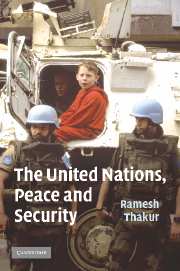Book contents
- Frontmatter
- Contents
- List of figures
- List of tables
- Foreword, Gareth Evans
- Acknowledgements
- Introduction
- PART I An international organisation for keeping the peace
- PART II Soft security perspectives
- PART III Hard security issues
- PART IV Institutional developments
- Conclusion: at the crossroads of ideals and reality
- Index
Foreword, Gareth Evans
Published online by Cambridge University Press: 24 May 2010
- Frontmatter
- Contents
- List of figures
- List of tables
- Foreword, Gareth Evans
- Acknowledgements
- Introduction
- PART I An international organisation for keeping the peace
- PART II Soft security perspectives
- PART III Hard security issues
- PART IV Institutional developments
- Conclusion: at the crossroads of ideals and reality
- Index
Summary
No organisation in the world embodies as many dreams, yet delivers as many frustrations, as the United Nations. Nothing could be nobler or more moving than its stated goals, not only ‘to save succeeding generations from the scourge of war’, but to ‘reaffirm faith in fundamental human rights’ and ‘promote social progress and better standards of life in larger freedom’. But only sporadically and erratically has the UN been the central player in advancing and achieving these objectives. For most of its history the Security Council has been a prisoner of great power manoeuvring; the General Assembly a theatre for empty rhetoric; the Economic and Social Council a dysfunctional irrelevance; and the Secretariat, for all the dedication and brilliance of a host of individuals, alarmingly inefficient.
Of course there have been great achievements along the way. Even during the desolate Cold War years there was the management of decolonisation, which can be legitimately characterised as the largest scale redress of human rights in history; the invention of peacekeeping as a wholly new means of conflict management; the giant strides made by UN agencies in feeding the starving, sheltering the dispossessed and immunising against disease. Since the end of the Cold War, the new cooperative environment enabled major new advances in peacemaking (with more civil conflicts resolved by negotiation in the last fifteen years, for the most part under UN auspices, than in the previous two hundred), tougher-edged peacekeeping and post-conflict peacebuilding.
- Type
- Chapter
- Information
- The United Nations, Peace and SecurityFrom Collective Security to the Responsibility to Protect, pp. xi - xvPublisher: Cambridge University PressPrint publication year: 2006



